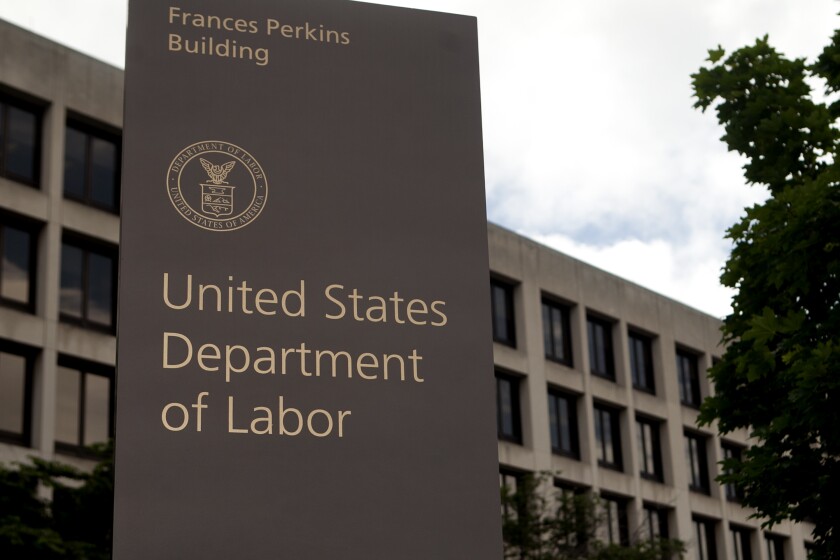WASHINGTON — Calling the coronavirus crisis “significantly worse than any recession since World War II,” Federal Reserve Chairman Jerome Powell warned that the central bank's emergency lending facilities might not be enough to keep businesses afloat if the downturn persists.
The Fed has unveiled roughly a dozen programs under its emergency powers to help boost different segments of the financial markets struggling under the weight of the pandemic, including efforts to backstop corporate and municipal bonds, and help fund the Paycheck Protection Program. Many of the programs are still in the planning stages, such as Main Street Lending Program, through which banks will offer loans to middle-market firms.
But Powell cautioned that the programs are more a short-term defense against liquidity strains than a permanent solution for companies' financial woes.
“A loan from a Fed facility can provide a bridge across temporary interruptions to liquidity, and those loans will help many borrowers get through the current crisis,” Powell said in an online video speech for the Peterson Institute for International Economics. “But the recovery may take some time to gather momentum, and the passage of time can turn liquidity problems into solvency problems.”
Powell also warned that without more fiscal support from Congress, the economy could face long-term damage and a tougher path to recovery.

“This trade-off is one for our elected representatives, who wield powers of taxation and spending,” Powell said. He emphasized that the Fed has the ability to act of its own accord but its mandate is limited to lending powers.
Powell added he didn’t believe it was appropriate for the Fed to weigh in on what fiscal measures Congress should consider.
“We don’t play a formal role in fiscal policy, meaning that we wouldn’t take a position … supporting a particular bill,” he said in response to a question from Adam Posen, the president of the Peterson Institute. “It’s not our role to supervise Congress; it’s actually the other way around.”
The speech came as the Fed has been urged to accelerate emergency facilities such as the Main Street Lending Program that were announced but have not gotten off the ground.
The Main Street program will go live in a few weeks, Powell said. He noted that it is different in substance from any of the credit facilities the central bank has stood up before, and is “completely unique in our history."
“We can make loans to solvent borrowers, and to solvent borrowers who don’t have access to other private sources of capital,” he said. “As I mentioned, the passage of time is really all it takes to turn a liquidity problem into a solvency problem, so we’ll be a big help for companies for a while, but over a longer period of time, it may be that more fiscal help is needed.”
The U.S. Small Business Administration and the Treasury Department relaunched the Paycheck Protection Program on Monday to new borrowers, prioritizing loans from community lenders.
Growth in small business jobs and wages declined last month as a result of the novel coronavirus pandemic, according to payroll giant Paychex.
The economic fallout from the coronavirus pandemic is continuing.
Powell also said that “avoidable household and business insolvencies can weigh on growth for years to come.” If small and medium-sized businesses close permanently, it would hamper job creation, he said.
“A prolonged recession and weak recovery could also discourage business investment and expansion, further limiting the resurgence of jobs as well as the growth of capital stock and the pace of technological advancement,” Powell said. “The result could be an extended period of low productivity growth and stagnant incomes.”
Already, the job gains the economy enjoyed in the past decade have been erased, making this downturn one “without modern precedent,” he said.
The economic slowdown is undoubtedly disproportionately affecting lower-income households. On Thursday the Fed will release survey results showing that about 40% of households earning less than $40,000 a year had experienced job loss in March, Powell said.
“This reversal of economic fortune has caused a level of pain that is hard to capture in words, as lives are upended amid great uncertainty about the future,” he said.
And although markets started pricing in the possibility of negative interest rates for the first time last week, Powell effectively ruled out that the Fed would consider lowering the federal funds rate beow zero.
The Federal Open Market Committee’s "view on negative rates really has not changed. This is not something that we're looking at,” he said, adding that the “evidence on the effectiveness of negative rates is mixed.”
“It’s an unsettled area, I would call it,” said Powell. “For now, it’s not something we’re considering.”
Powell also appeared to throw cold water on the idea of a quick economic recovery.
Although the U.S. economy has already lost about 20 million jobs since the onset of the coronavirus, Powell said he doesn’t believe that unemployment has reached its peak.
“I would say that probably over the course of the next month or so, unemployment will peak” and will likely remain well above the record-high levels of earlier this year, as well as the levels of 2019 and 2018, Powell said. But he also said that returning to those historically high levels of unemployment is not out of the question.
“It’ll take some time to get back to where we were,” Powell said. “I have every reason to think we can get back where the economy should substantially recover once the virus is under control.”




